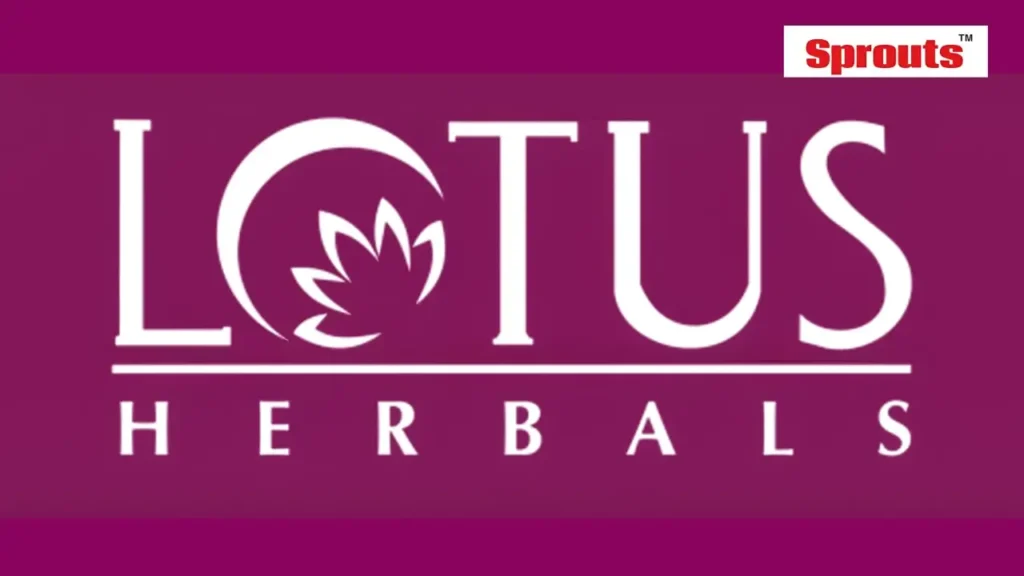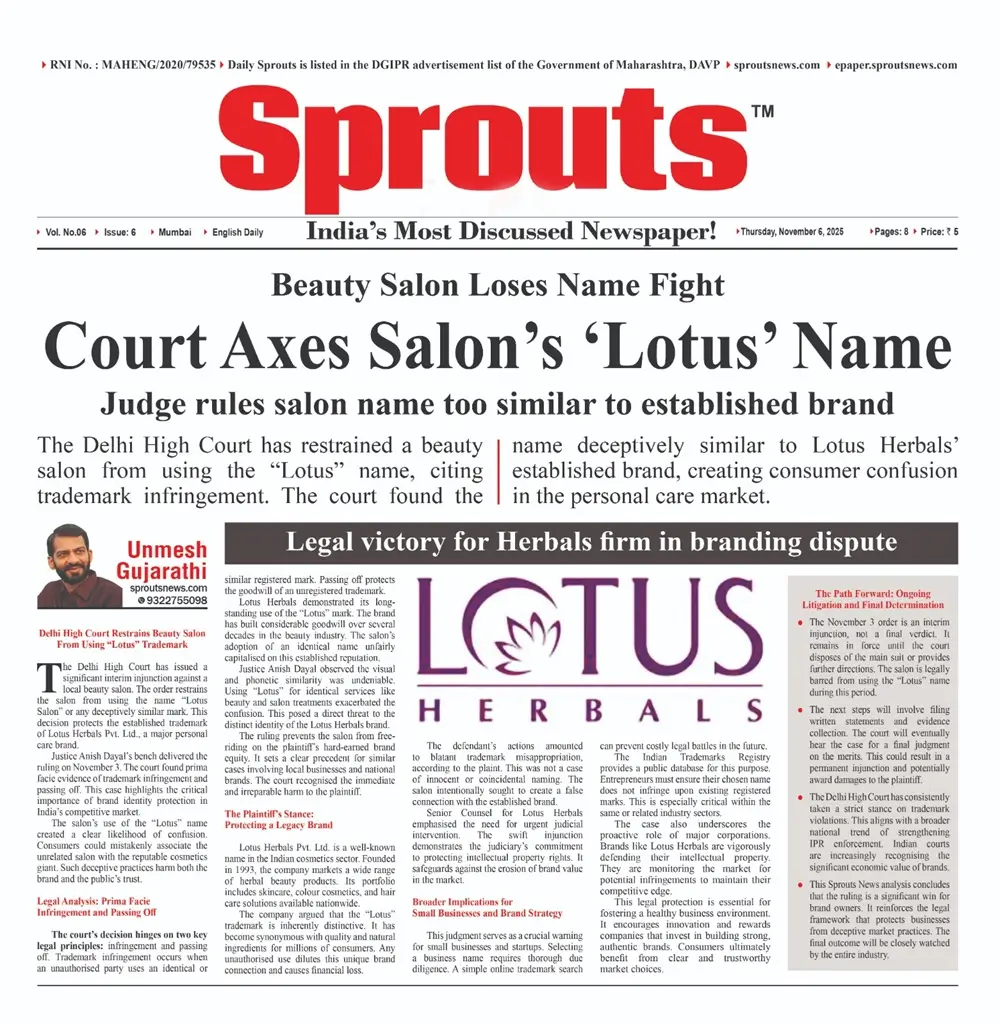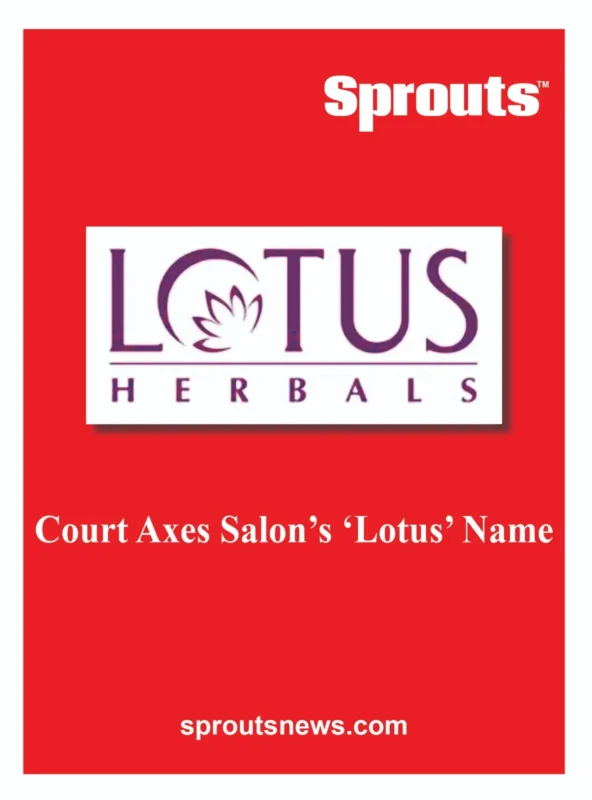Delhi HC Restrains Beauty Salon in Lotus Herbals Trademark Case
• Lotus Herbals Wins Trademark Battle Against Infringing Salon
• Court Orders Salon to Stop Using “Lotus” in Brand Name
• Brand Protection Victory for Personal Care Giant
The Delhi High Court has granted an interim injunction in favor of Lotus Herbals Pvt. Ltd., restraining a beauty salon from using the name “Lotus” or any deceptively similar mark. Justice Anish Dayal ruled that the salon’s branding could mislead consumers into believing an affiliation with the well-known personal care giant. This case marks a significant trademark protection victory for Lotus Herbals and reinforces brand identity safeguards under Indian intellectual property law.
- Delhi HC Restrains Beauty Salon in Lotus Herbals Trademark Case
- • Lotus Herbals Wins Trademark Battle Against Infringing Salon
- • Court Orders Salon to Stop Using “Lotus” in Brand Name
- • Brand Protection Victory for Personal Care Giant
- Delhi High Court Restrains Beauty Salon From Using “Lotus” Trademark
- Legal Analysis: Prima Facie Infringement and Passing Off
- The Plaintiff’s Stance: Protecting a Legacy Brand
- Broader Implications for Small Businesses and Brand Strategy
- The Path Forward: Ongoing Litigation and Final Determination
Click Here To Download the News Attachment
Delhi High Court Restrains Beauty Salon From Using “Lotus” Trademark
The Delhi High Court has issued a significant interim injunction against a local beauty salon. The order restrains the salon from using the name “Lotus Salon” or any deceptively similar mark. This decision protects the established trademark of Lotus Herbals Pvt. Ltd., a major personal care brand.
Justice Anish Dayal’s bench delivered the ruling on November 3. The court found prima facie evidence of trademark infringement and passing off. This case highlights the critical importance of brand identity protection in India’s competitive market.
The salon’s use of the “Lotus” name created a clear likelihood of confusion. Consumers could mistakenly associate the unrelated salon with the reputable cosmetics giant. Such deceptive practices harm both the brand and the public’s trust.
Legal Analysis: Prima Facie Infringement and Passing Off
The court’s decision hinges on two key legal principles: infringement and passing off. Trademark infringement occurs when an unauthorised party uses an identical or similar registered mark. Passing off protects the goodwill of an unregistered trademark.
Lotus Herbals demonstrated its long-standing use of the “Lotus” mark. The brand has built considerable goodwill over several decades in the beauty industry. The salon’s adoption of an identical name unfairly capitalised on this established reputation.
Justice Anish Dayal observed the visual and phonetic similarity was undeniable. Using “Lotus” for identical services like beauty and salon treatments exacerbated the confusion. This posed a direct threat to the distinct identity of the Lotus Herbals brand.
The ruling prevents the salon from free-riding on the plaintiff’s hard-earned brand equity. It sets a clear precedent for similar cases involving local businesses and national brands. The court recognised the immediate and irreparable harm to the plaintiff.
Also Read: Thane Bank Recruitment Scam: Blacklisted Firm Hired Secretly.
The Plaintiff’s Stance: Protecting a Legacy Brand
Lotus Herbals Pvt. Ltd. is a well-known name in the Indian cosmetics sector. Founded in 1993, the company markets a wide range of herbal beauty products. Its portfolio includes skincare, colour cosmetics, and hair care solutions available nationwide.
The company argued that the “Lotus” trademark is inherently distinctive. It has become synonymous with quality and natural ingredients for millions of consumers. Any unauthorised use dilutes this unique brand connection and causes financial loss.
The defendant’s actions amounted to blatant trademark misappropriation, according to the plaint. This was not a case of innocent or coincidental naming. The salon intentionally sought to create a false connection with the established brand.
Senior Counsel for Lotus Herbals emphasised the need for urgent judicial intervention. The swift injunction demonstrates the judiciary’s commitment to protecting intellectual property rights. It safeguards against the erosion of brand value in the market.
Broader Implications for Small Businesses and Brand Strategy
This judgment serves as a crucial warning for small businesses and startups. Selecting a business name requires thorough due diligence. A simple online trademark search can prevent costly legal battles in the future.
The Indian Trademarks Registry provides a public database for this purpose. Entrepreneurs must ensure their chosen name does not infringe upon existing registered marks. This is especially critical within the same or related industry sectors.
The case also underscores the proactive role of major corporations. Brands like Lotus Herbals are vigorously defending their intellectual property. They are monitoring the market for potential infringements to maintain their competitive edge.
This legal protection is essential for fostering a healthy business environment. It encourages innovation and rewards companies that invest in building strong, authentic brands. Consumers ultimately benefit from clear and trustworthy market choices.
The Path Forward: Ongoing Litigation and Final Determination
The November 3 order is an interim injunction, not a final verdict. It remains in force until the court disposes of the main suit or provides further directions. The salon is legally barred from using the “Lotus” name during this period.
The next steps will involve filing written statements and evidence collection. The court will eventually hear the case for a final judgment on the merits. This could result in a permanent injunction and potentially award damages to the plaintiff.
The Delhi High Court has consistently taken a strict stance on trademark violations. This aligns with a broader national trend of strengthening IPR enforcement. Indian courts are increasingly recognising the significant economic value of brands.
This Sprouts News analysis concludes that the ruling is a significant win for brand owners. It reinforces the legal framework that protects businesses from deceptive market practices. The final outcome will be closely watched by the entire industry.



















